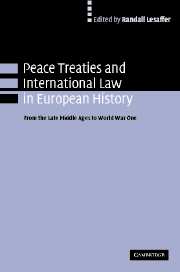Book contents
- Frontmatter
- Contents
- List of contributors
- Acknowledgements
- Table of Treaties
- List of abbreviations
- 1 Introduction
- PART I Peace treaties and international law from Lodi to Versailles (1454–1920)
- PART II Thinking peace: voices from the past
- 5 Vestigia pacis. The Roman peace treaty: structure or event?
- 6 The influence of medieval Roman law on peace treaties
- 7 The kiss of peace
- 8 Martinus Garatus Laudensis on treaties
- 9 The importance of medieval canon law and the scholastic tradition for the emergence of the early modern international legal order
- 10 The Peace Treaties of Westphalia as an instance of the reception of Roman law
- PART III Thinking peace: towards a better future
- PART IV Making peace: aspects of treaty practice
- PART V Conclusion
- Appendix
- Index
9 - The importance of medieval canon law and the scholastic tradition for the emergence of the early modern international legal order
Published online by Cambridge University Press: 07 July 2009
- Frontmatter
- Contents
- List of contributors
- Acknowledgements
- Table of Treaties
- List of abbreviations
- 1 Introduction
- PART I Peace treaties and international law from Lodi to Versailles (1454–1920)
- PART II Thinking peace: voices from the past
- 5 Vestigia pacis. The Roman peace treaty: structure or event?
- 6 The influence of medieval Roman law on peace treaties
- 7 The kiss of peace
- 8 Martinus Garatus Laudensis on treaties
- 9 The importance of medieval canon law and the scholastic tradition for the emergence of the early modern international legal order
- 10 The Peace Treaties of Westphalia as an instance of the reception of Roman law
- PART III Thinking peace: towards a better future
- PART IV Making peace: aspects of treaty practice
- PART V Conclusion
- Appendix
- Index
Summary
Introduction
It is becoming increasingly clear that the rise of the consensus-based early modern treaty and the law of nations was highly determined by the medieval tradition of canon and Roman law, and of scholastic philosophy and theology. The role played by the principle of pacta sunt servanda, a basic principle of natural law, as the cornerstone of early modern treaty law is one of the most striking examples of the way in which canon law influenced the early modern doctrine of treaty law. However, how must this medieval influence be understood? What did it mean? How can it be described?
These questions cannot easily be resolved because of the complex character of the various evolutions that took place. In this chapter, two central elements that emerged throughout the medieval period will be dealt with: natural law and voluntarism. More specifically, these two topics will be treated from their close intertwinement with the legal order that came into being as an original product of the Middle Ages. This legal structure was based upon the antagonism between, on the one hand, the legal subject and, on the other hand, the public, objective legal order.
- Type
- Chapter
- Information
- Peace Treaties and International Law in European HistoryFrom the Late Middle Ages to World War One, pp. 198 - 221Publisher: Cambridge University PressPrint publication year: 2004
- 2
- Cited by



